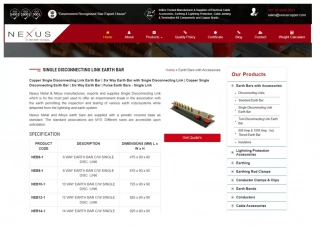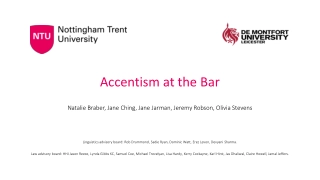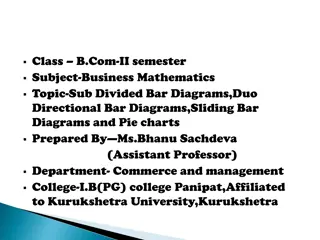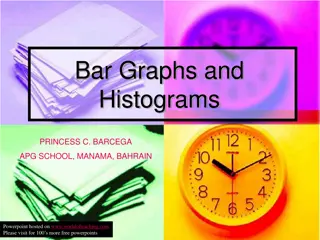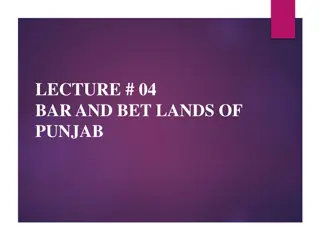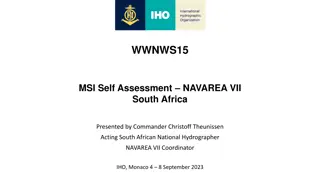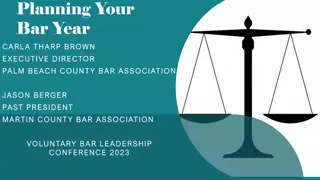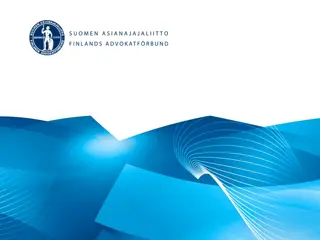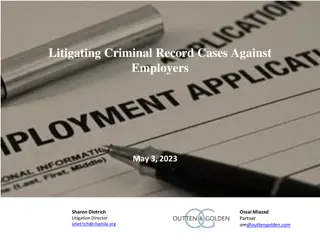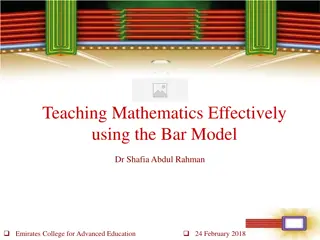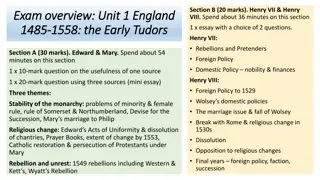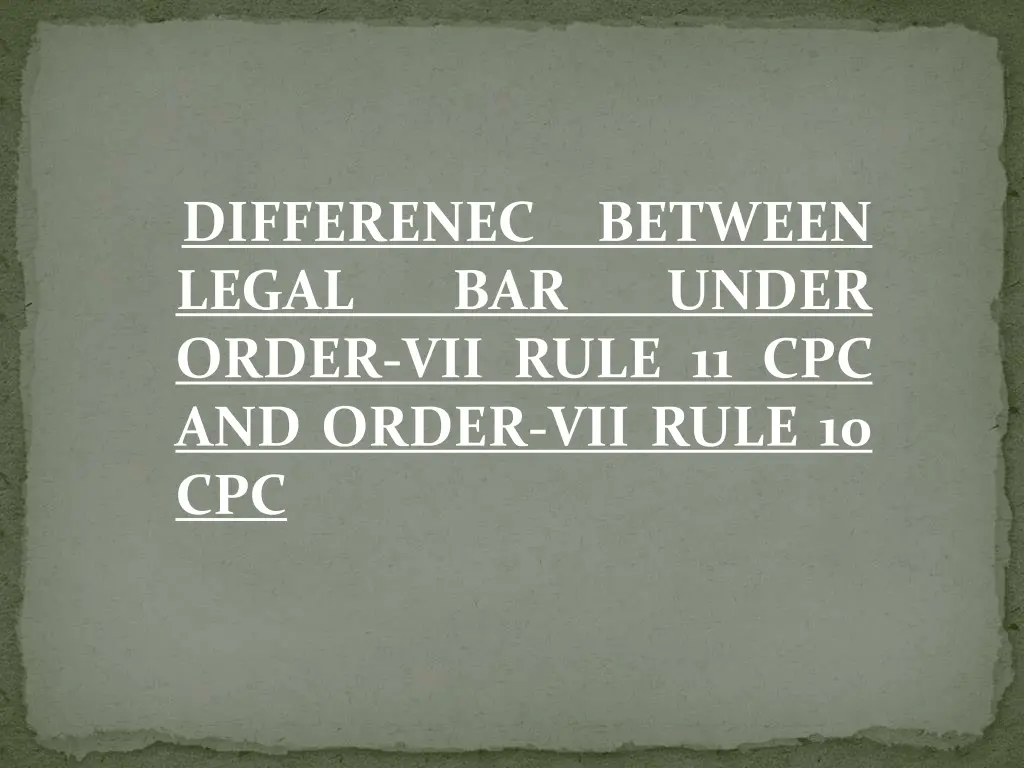
Difference Between Legal Bar Order VII Rule 11 CPC vs Order VII Rule 10 CPC
This presentation delves into the distinctions between legal bars under Order VII Rule 11 CPC (specifically clause (d)) and Order VII Rule 10 CPC. It touches upon the rejection of plaint under Order VII Rule 11 CPC, discussing competency of suits, causes of action, valuation of relief claimed, and more. Understanding the nuances between these legal provisions is crucial for comprehending the procedural aspects of civil court jurisdiction.
Download Presentation

Please find below an Image/Link to download the presentation.
The content on the website is provided AS IS for your information and personal use only. It may not be sold, licensed, or shared on other websites without obtaining consent from the author. If you encounter any issues during the download, it is possible that the publisher has removed the file from their server.
You are allowed to download the files provided on this website for personal or commercial use, subject to the condition that they are used lawfully. All files are the property of their respective owners.
The content on the website is provided AS IS for your information and personal use only. It may not be sold, licensed, or shared on other websites without obtaining consent from the author.
E N D
Presentation Transcript
DIFFERENEC BETWEEN LEGAL BAR ORDER-VII RULE 11 CPC AND ORDER-VII RULE 10 CPC UNDER
The aim of instant presentation is to draw line between legal bars contained under Order-VII rule 11- CPC (referring to clause (d)) and Order-VII rule 10 CPC. Definition of CPC: CPC is a constitution of civil courts for adjudicating civil disputes. It is foundation subject for anyone to understand civil jurisdiction and procedure of civil courts. That is why it is called procedural law as it contains the procedure in civil suits.
REJECTION OF PLAINT UNDER ORDER-VII RULE 11 CPC Order VII rule 11 CPC pertains to competency of suit and court can discuss merits of case. When we say that suit is barred by law, law includes- constitution, statutes, judicial principles, rules, by-laws etc. Before discussing clause (d) of Order-VII rule 11 CPC, 1908 it would be appropriate to have a cursory glance on rest of grounds enshrined under Order-VII rule-11 CPC.
A. Does not disclose a cause of action: Cause of action is the technical legal name for the set of facts which give rise to a claim enforceable in court. In PLD 2002 408 Karachi-High Court Sindh, 2022 CLC 202 Peshawar-High-Court-Peshawar (Muhammad Nawaz Khan Vs. Bahadar Nawaz Khan held that accrual of cause of action needs pro and contra evidence and non-disclosure of cause of action results into rejection of plaint.
It is also held by august Peshawar High court, Peshawar in case titled as Ismail VERSUS Syed Zulfiqar Hussain Shah 2021 PLD 98 that there is a different between non- accrual of cause of action and non- disclosure of cause of action. Non-accrual of cause of action results into dismissal of suit after recording of evidence whereas non-disclosure of cause of action results into rejection of plaint. The same view has been taken in 2010 PLD 65 Quetta- High Court Balouchistan
B. Where the relief claimed in the plaint is under valued: Valuation of a suit is for purpose of determining the pecuniary jurisdiction of court in which it should be filed and ii For fixation of court fees to be paid The initial duty of determination of proper valuation of relief is upon the plaintiff then it is the duty of court. Trial court has also authority to change valuation of suit either on its own motion or on objection by defendant under section11 of suits valuation act, 1887. 2016 PLD 409 SC
Objection as to jurisdiction neither raised in court of first instance nor in court of appeal, it should not be allowed to be raised afterwards. One may embark upon 1956 PLD 214 Lahore High Court, 1986 MLD 1182 LHC,1986 PLD 242 LHC, 1989 MLD 1776 Khi.HC, 1992 MLD 1309 SC,2001 YLR 3280 SC.
When trial court accepts the plaint after objection or makes its own determination , which is accepted by the plaintiff, then it is the end of the matter and thereafter all the proceedings must be controlled by valuation so fixed by the court. Wisdom is drawn from 1989 CLC 1515 LHC. Court has power to extend time already granted, if sufficient reasons are put-forth. 2020 YLR 745 LHC,2019 MLD 2029 PHC Forum of appeal would be determined by that valuation fixed by court or in case when court has not determined then by the plaintiff under section 3 of suits and valuation Act
C. Where suit has been properly valued but not properly stamped The court has ultimate duty to determine proper court fees payable by the plaintiff and grant reasonable time to make good the deficiency of court fee. The court has discretionary power to extent time granted unless there is contumacy, gross negligence and malafide under section 148 and 149 CPC 1984 CLC 1189 In case plaint not properly stamped or insufficiently stamped , it is no plaint in eye of law and there is no suit instituted 1967 PLD 154 LHC
D. When suit is barred by law: The law means written law or statute law and is used in generic sense. Law means a formal pronouncement of the will of a competent law-giver. Law includes- constitution, statutes, judicial principles, rules, by-laws etc.
Some illustrations when the suit is barred by law The relief relinquished in respect of one cause of action is barred under Order II Rule 2 of C.P.C 1908. The suit hit by doctrine of estoppel is barred under article 114 of Qanun-e-Shadat Order 1984. When suit withdrawn without permission, fresh suit barred on same cause of action under Order XXIII Rule 3 read with section 12(1) CPC.
The suit for permanent injunction restraining public functionaries from official functions is barred under section 56 (d) of Specific Relief Act 1877; When suit is hit by limitation. For example article 120 of limitation Act, 1908 provides six years time period for filing suit for declaration from date of accrual of cause of action, if it is filed beyond the prescribed time period.
When suit is hit by principal of res-judicata. For example when courts dismisses suit under Order-XVII rule 3 CPC, then it is held in Shahid Hussain Versus Lahore Muncipal Corporation (1981 PLD 474 Supreme-Court) and Ahmed Sher and others Versus Muhammad Hayat (2006 PLD 448 Supreme-Court) that order dismissing the suit under Order-XVII rule 3-CPC, in case party fails to produce evidence, is deemed to be judgment on merits unlike Order-XVII rule 2-CPC and also attracts principle of res-judicata. It is further held inthat dismissal of the suit also amounts to decree.
Simple question pertains to correction in undisputed entries in records falls within section 172 of West Pakistan Land Revenue Act, 1967 and when matter pertains to title then civil court is the only forum. Wisdom is drawn from 2014 YLR 2130 Peshawar-High- Court-Peshawar (Wahab Gul Vs. Sikandar Ali); When a person approaches court in function under section 42 of Specific Relief Act, 1887 for creation of his new rights or abstract rights. For example on basis of unregistered deed suit for declaration cannot be filed 2003 SCMR 50 (Rehmatullah Khan v. Government of Pakistan) and 2019 YLR 505 Peshawar High Court Peshawar (Muhammad Yar Khan Vs. Ajab Khan);
Lacks of Talbs in the prescribed mode as enshrined under Pre-emption Act, suit is incompetent, hence, liable to be rejected. 1995 PLD 344 Lahore-High-Court ( Noor Begum Vs. Muhammad Boota) and 1989 MLD 184 Lahore-High-Court ( Faqir Muhammad Vs. District Judge, Kasur); When suit is not conforming to requirements of section 92 of CPC read with section 2(20) and (21) of West Pakistan General clause Act, 1956, according to sections ibid suit wherein subject matter is waqf property, not enforcing personal rights, then suit by two persons having common interest or consent of advocate general is must and it must be filed principal court i.e District Judge;
In PLD 2022 Supreme Court 716 (Muhammad Anwar (deceased) through LRs and others Vs. Essa and others principles for institution of fresh suit is prescribed after rejection of plaint under Order-VII rule 11-CPC. It has been held that if plaint is rejected on three grounds mentioned in Order-VII rule 11-CPC i.e does not disclose cause of action, suit is under-valued and not properly stamped, then fresh suit can be filed under Order-VII rule 13 CPC by removing those deficiencies. But not when plaint is rejected under Order-VII rule 11 (d), in this case unless findings of court barring suit under law is reversed;
If one of relief is maintainable and other is non- maintainable, then plaint shall not be rejected. 2022 SCMR 1842 (Rashid Ahmad Vs. Nazar Hussain);
RETURN OF PLAINT UNDER ORDER-VII RULE 10 Under Order-VII rule 10-CPC comes into play when court lacks jurisdiction to entertain matter and court cannot discuss merits of case as opposed to Order-VII rule-11 CPC where court can discuss merits of case. In other words, it relates to competency of court. Competency refers to pecuniary, territorial and subject-matter. Civil courts have four types of jurisdiction:
Subject Matter Jurisdiction: It can try cases of a particular type and relate to a particular subject. Territorial Jurisdiction: It can try cases within its geographical limit, and not beyond the territory. Pecuniary Jurisdiction: Cases related to money matters, suits of monetary value. Personal jurisdiction: It relates to a person. For example where minor resides petition under Guardian and Wards Act should be filed within precincts of a court where minor resides.
Some illustrations when the suit be returned under Order-VII rule 10 CPC Article 212 of the Constitution of Islamic Republic of Pakistan (matter relating to the terms and conditions of civil servants) Article 225 of the Constitution, (matter pertains to the elections of the National or Provincial Assembly can only be challenged through election petition before election tribunals) Where the amount or value of subject-matter is rupees fifty million or above, then suit shall be filed in the court of District as enshrined under KPK CPC (Amendment) Ordinance, 2020;
When petition for guardianship of minor filed other than court where minor resides; When property situates in M as well as in place N and agreement is penned down in place N and also registered there i.e. N , thus, both courts in places M and N has got the jurisdiction but where clause of agreement, arrived and binding upon parties, granting exclusive jurisdiction to civil courts in place N , then, civil courts in place N has got exclusive jurisdiction to entertain and try suit;
When a person approaches civil court in function soliciting correction in khasra girdawari, then, civil suit is barred under section 172 and 53 of West Pakistan Land Revenue Act, 1967. Collector is the competent forum. One may embark upon PLD 1990 Peshawar High Court, Peshawar page 108 (Mirbaz Khan Vs. Atlas Khan); Revenue hierarchy can make correction in revenue record without touching title of parties but when it touches so, then aggrieved person may approach civil court under section 42 of Specific Relief Act or under section 53 of West Pakistan Land Revenue Act, 1967. 1996 SCMR 98 Supreme Court (Rasta Mal Khan Vs. Nabi Sarwar Khan) and 1984 CLC 1167 Lahore-High-Court-Lahore (Haji Vs. Member of Board of Revenue); Matters falls within precincts of special courts such as Banking Court, Labor Courts; Consumer Courts etc;
In 2022 SCMR 1598 Supreme-Court (President Zarai Taraqiati Bank Limited, Head Office, Islamabad Vs. Kishwar Khan) that if court forms an opinion that it has no jurisdiction to entertain the suit, the court cannot dismiss the suit, the court is required to return the plaint under Order-VII rule 10 CPC directing the plaintiff to approach proper court. The judge must endorse date of presentation, date of return, the name of party representing it and brief reasons of returning. In 2022 CLC 1397 Lahore-High-Court-Lahore (Facts Finders (PVT.) Ltd Vs. CNBC Pakistan), that return of plaint is difference from rejection of plaint. Return of plaint does not mean that there is mistakes in drafting plaint or there is mistakes in plaint, it only relates to point of jurisdiction;
PLD 2003 Karachi (Messrs Pakistan Agro Forestry Corporation Ltd: Vs. T.C. PAF Pakistan (PVT.) Ltd and others) and Remedies with person aggrieved of return order of court i. To challenge order of court before appellant forum or ii. He may present suit in court having jurisdiction or iii. He may give up part of relief via amendment or by reducing valuation so that it may be cognizable by court or iv. He may file fresh suit in court having jurisdiction.
CONCLUSION: The nutshell my above discussion is that Order- VII rule 11 CPC pertains to competency of suit, court having jurisdiction and court can discuss merits of suit unlike Order-VII rule-10 CPC which pertains to competency of court to hear suit without touching merits of case. Provisions contained therein are mandatory in nature.

